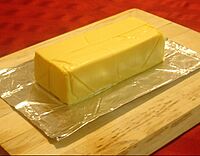Velveeta facts for kids
 |
|
 |
|
| Owner | Kraft Heinz |
|---|---|
| Introduced | 1918 |
| Markets | United States, Canada |
| Previous owners |
|
| Tagline | That's La Dolce Velveeta |
Velveeta is a popular brand of processed cheese that tastes a lot like American cheese. It was first created in 1918 by a person named Emil Frey. He worked for the Monroe Cheese Company in Monroe, New York. In 1923, a separate company called The Velveeta Cheese Company was started. Just a few years later, in 1927, a big food company called Kraft Foods Inc. bought Velveeta.
Contents
The Story of Velveeta
How Velveeta Was Invented
Back in 1888, the Monroe Cheese Company hired a cheesemaker named Emil Frey. He was very good at making cheese. The company faced some money problems, even though one of Frey's cheeses, Liederkranz cheese, was successful.
Later, a new owner, Jacob Weisl, bought the company in 1891. He also had another factory that made mostly Swiss cheese. Sometimes, pieces of cheese would break during the making process. Weisl sent these broken pieces to the Monroe factory, hoping to find a way to use them instead of wasting them.
Emil Frey took these broken cheese pieces home. For two years, he worked hard to find a way to make something new from them. In 1918, he finally had a great idea! He mixed the broken cheese bits with other cheese parts. This created a smooth, new cheese blend. He called it Velveeta because it felt "velvety smooth."
Velveeta Joins Kraft
On February 14, 1923, Emil Frey started a separate company just for Velveeta. It was independent from the Monroe Cheese Company. In 1926, the Monroe Cheese Company closed down. One year later, Velveeta was sold to Kraft.
Since then, Velveeta has grown into many different products. These include cheesy bites, macaroni and cheese, and cheesy skillet meals.
In the 1930s, Velveeta was the first cheese product to get a special approval from the American Medical Association. This showed it was considered a good food choice. In 1953, its recipe was changed to be a "cheese spread." Today, in the United States, Velveeta is called a "pasteurized prepared cheese product."
What's in Velveeta?
| Nutritional info | |
|---|---|
| Other names | Pasteurized Recipe Cheese Product |
| Source of milk | Cow |
| Texture | Soft and creamy |
| Fat content | 21% |
| Protein content | 18% |
Kraft Foods lists the ingredients in Velveeta. These include milk, canola oil, and different parts of milk like whey and milk protein concentrate. It also has a small amount of salt, calcium phosphate, and other ingredients that help make it smooth and keep it fresh. These include lactic acid, sorbic acid, and sodium citrate. Natural colors like apocarotenal and annatto are also added.
What is a "Pasteurized Prepared Cheese Product"?
In 2002, the FDA (Food and Drug Administration) in the U.S. sent a letter to Kraft. The letter said that Velveeta's packaging incorrectly called it a "pasteurized process cheese spread." This was because Velveeta contained something called milk protein concentrate (MPC). Because of this ingredient, Velveeta didn't fit the FDA's official definitions for cheese.
So, now Velveeta is sold in the U.S. as a "pasteurized prepared cheese product." This is a special term that the FDA doesn't have a specific definition for.
How Velveeta is Advertised
Kraft Foods often advertises Velveeta as a key ingredient for dishes like chile con queso (a cheesy dip) and grilled cheese sandwiches. You can find Velveeta in many countries. These include the United States, Canada, Panama, Hong Kong, the Philippines, and South Korea. In the 1930s and 1940s, it was even sold in the United Kingdom and Germany under the name "Velveta."
In the 1980s, Velveeta had a famous jingle in its TV commercials. It said, "Colby, Swiss and Cheddar, blended all together." This jingle helped explain its taste and texture to people. At that time, real cheese was used in the product.
See also
 In Spanish: Velveeta para niños
In Spanish: Velveeta para niños
 | Charles R. Drew |
 | Benjamin Banneker |
 | Jane C. Wright |
 | Roger Arliner Young |

